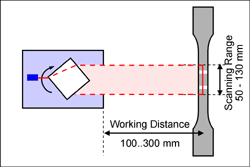
The laser extensometer - type parallel scanner is used for non-contact measurement of strain or compression of specimen at uniaxial load. Before starting the experiment, two marks are put on the sample. A laser beam is directed onto a rotating optical flat. During entering and leaving the laser beam is refracted at two opposite planes of the optical flat which results in an identical refractive angle. By the rotation of the optical flat, the laser beam is deflected in parallel to itself and is directed onto the specimen. The laser extensometer scans the measuring range with a visible laser beam. After automatically determining the reference length at the beginning, the positions of the marks are continuously observed throughout the experiment.
|